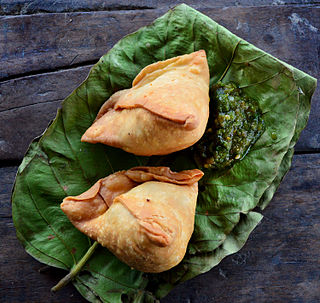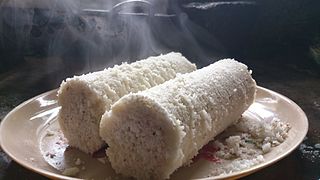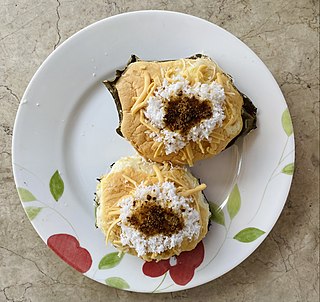Related Research Articles

Mangalore, officially known as Mangaluru, is a major industrial port city in the Indian state of Karnataka and on the west coast of India. It is located between the Laccadive Sea and the Western Ghats about 352 km (219 mi) west of Bangalore, the state capital, 14 km north of Karnataka–Kerala border and 297 km south of Goa. Mangalore is the state's only city to have all four modes of transport—air, road, rail and sea. The population of the urban agglomeration was 619,664 according to the 2011 national census of India. It is known for being one of the locations of the Indian strategic petroleum reserves.

A dosa is a thin, savoury crepe in South Indian cuisine made from a fermented batter of ground white gram and rice. Dosas are served hot, often with chutney and sambar. Dosas are popular in South Asia as well as around the world.

A samosa is a fried South Asian pastry with a savoury filling, mostly vegetables, spiced potatoes, onions, peas, also non-vegetarian meat, or fish. It is made into different shapes, including triangular, cone, or crescent, depending on the region. Samosas are often accompanied by chutney, and have origins in medieval times or earlier. Sweet versions are also made. Samosas are a popular entrée, appetizer, or snack in the cuisines of South Asia, the Middle East, Central Asia, East Africa and their South Asian diasporas.

Trinidad and Tobago has a unique history and its food is influenced by Indian-South Asian, West African, Creole, European, American, Chinese, Amerindian, and Latin American culinary styles. Trinidadian and Tobagonian food is dominated by a wide selection of dishes, most notably, doubles, roti, pelau, callaloo and curried crab and dumplings. Trinidad and Tobago is also known for its prepared provisions, such as dasheen, sweet potato, eddoes, cassava, yam, soups and stews, also known as blue food across the country. Corresponding to the Blue Food Day event held annually in Trinidad and Tobago.

Filipino cuisine is composed of the cuisines of more than a hundred distinct ethnolinguistic groups found throughout the Philippine archipelago. A majority of mainstream Filipino dishes that compose Filipino cuisine are from the food traditions of various ethnolinguistic groups and tribes of the archipelago, including the Ilocano, Pangasinan, Kapampangan, Tagalog, Bicolano, Visayan, Chavacano, and Maranao ethnolinguistic groups. The dishes associated with these groups evolved over the centuries from a largely indigenous base shared with maritime Southeast Asia with varied influences from Chinese, Spanish, and American cuisines, in line with the major waves of influence that had enriched the cultures of the archipelago, and adapted using indigenous ingredients to meet local preferences.

Puran poli is an Indian sweet flatbread that is popular in South India and the state of Maharashtra. It is also known as Puran puri, Holige, Obbattu, Bobbattlu, Poley, Bakshamulu, and Boli.

Idiyappam, also known as indiappa, noolputtu, noolappam (நூலப்பம்/நூலாப்பம்), santhagai, or ottu shavige, is a string hopper dish originating from southern India. It consists of rice flour pressed into noodles, laid into a flat disc-like shape and steamed. The dish also spread to Southeast Asia, where it is called putu mayam in Malaysia and Singapore, and putu mayang in Indonesia.

Puttu, also called pittu, is a dish native to the Southern Indian states of Kerala, Tamil Nadu, and parts of Karnataka, as well as Sri Lanka. It is made of steamed cylinders of ground rice layered with coconut shavings, sometimes with a sweet or savory filling on the inside. Puttu is usually a breakfast dish served hot with either sweet side dishes such as palm sugar or banana, or savoury with chana masala, chutney, rasam, or meat curries.

Bibingka commonly refers to a type of baked rice cake from the Philippines that is traditionally cooked in a terracotta oven lined with banana leaves and is usually eaten for breakfast or as merienda especially during the Christmas season. It is also known as bingka in the Visayas and Mindanao islands.

Batata vada is a popular vegetarian fast food dish from the Indian state of Maharashtra. The dish consists of a mashed potato patty coated with chickpea flour, which is then deep-fried and served hot with chutney. The vada is typically around two or three inches in diameter. Across different regions of India, this dish is also known as aloo bonda, aloo vada, batata bonda, potato bonda and potato vada.

Rosette are thin, cookie-like fritters made with iron molds that are found in many cultures. They are crispy and typified by their lacy pattern.

Puto is a Filipino steamed rice cake, traditionally made from slightly fermented rice dough (galapong). It is eaten as is or as an accompaniment to a number of savoury dishes. Puto is also an umbrella term for various kinds of indigenous steamed cakes, including those made without rice. It is a sub-type of kakanin.

Ravish Kumar is an Indian journalist, author, media personality and YouTuber. He was the Senior Executive Editor of NDTV India. He hosted a number of programmes including the channel's flagship weekday show Prime Time, Hum Log, Ravish Ki Report, and Des Ki Baat.

Medu vada is a South Indian breakfast snack made from Vigna mungo. It is usually made in a doughnut shape, with a crispy exterior and soft interior. A popular food item in South Indian cuisine it is generally eaten as a breakfast or a snack.

Rahul Verma is an Indian social activist and founder of the Uday Foundation, a non profit organization named after his son, who was born with multiple congenital defects. His work includes distribution of free food to poor patients and their caregivers outside hospitals and related to health and dignity of destitute in India.
Yagati is a hobli in the southern state of Karnataka, India. It is located in the Kadur taluk of Chikmagalur district.

Indian Indonesian cuisine is characterized by the mixture of Indian cuisine with local Indonesian-style. This cuisine consists of adaptations of authentic dishes from India, as well as original creations inspired by the diverse food culture of Indonesia. Indian influence can be observed in Indonesia as early as the 4th century. Following the spread of Islam to Indonesia and trading, Muslim Indian as well as Arab influences made their way into Indonesian cuisine. Examples include Indian biryani, murtabak, curry and paratha that influenced Acehnese, Minangkabau, Malay, Palembangese, Betawi and Javanese cuisine.
References
- ↑ "Not turkey or plum cake, a traditional Indian Christmas table is lined with Kulkuls, sannas & fruit wines". The Economic Times. 2018-12-23. Retrieved 18 May 2019.
- ↑ "'Rome of the East' celebrates Christmas". Deccan Herald. 2009-12-24. Retrieved 18 May 2019.
- ↑ "Christmas delicacies of the coast". Deccan Herald. 2017-12-18. Retrieved 18 May 2019.
- 1 2 "Goan Nevri Recipe by Niru Gupta". NDTV Food. Retrieved 18 May 2019.
- ↑ "Holi 2018: 7 Innovative Gujiya Filling Ideas To Take Your Gujiya Game To The Next Level!". NDTV Food. Retrieved 2019-06-16.